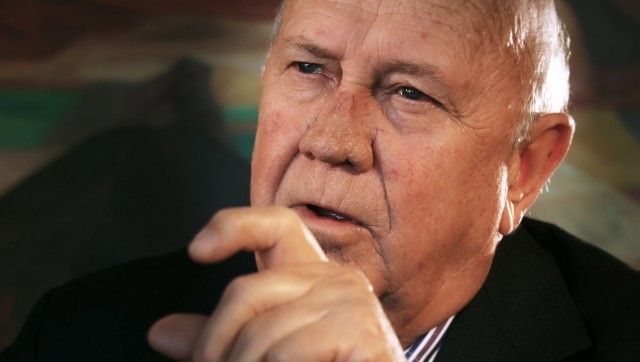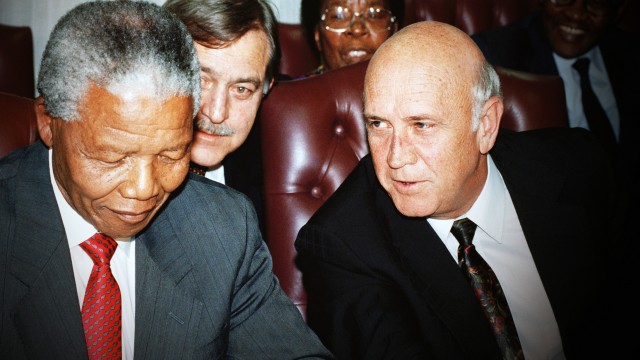
Former South African president offers insight into his life and career in new documentary (photo by Baraka Productions)
F. W. DE KLERK AND THE END OF APARTHEID (Nicolas Rossier, 2014)
Quad Cinema
34 West 13th St.
Opens Friday, February 6
212-255-2243
www.quadcinema.com
www.firstrunfeatures.com
 In The Other Man: F. W. de Klerk and the End of Apartheid, filmmaker Nicolas Rossier examines the legacy of the man who won the 1993 Nobel Peace Prize with Nelson Mandela, painting an intriguing portrait of former South African president Frederik Willem de Klerk, who ended the ban on the African National Congress and ultimately ceded power to Mandela. “I’ve come to the conclusion that apartheid was wrong, that it was morally unjustifiable, and therefore it had to be changed,” de Klerk states emphatically in the film. “And I’m not justifying in any way the wrongs which took place and which was done to the majority of the people living in South Africa in the period of apartheid and separate development.” De Klerk was born into a privileged family, his father one of the chief architects of apartheid, which its supporters prefer to call “separate development.” Taking over the presidency in 1989 from P. W. Botha, de Klerk saw the inevitable downfall of white leadership in South Africa and worked with Mandela to create a new future for the country. Rossier speaks with such anti-apartheid activists as Mathews Phosa, Albie Sachs, Yasmin Sooka, Randall Robinson, and Father Michael Lapsley; such members of de Klerk’s inner circle as Director General David Steward, cabinet ministers Leon Wessels and Roelf Meyer, and friend and foreign ministry spokeswoman Alayne Reesberg; journalists Allister Sparks and Max du Preez; human rights abuse investigator Richard Goldstone; U.S. assistant secretary of state Chester Crocker; former SADF soldier Piet Croucamp; and former South African president Thabo Mbeki, who share wide-ranging opinions and stories about de Klerk as a man and a politician, examining his motives and responsibilities and placing them in context of the changes swirling throughout his country.
In The Other Man: F. W. de Klerk and the End of Apartheid, filmmaker Nicolas Rossier examines the legacy of the man who won the 1993 Nobel Peace Prize with Nelson Mandela, painting an intriguing portrait of former South African president Frederik Willem de Klerk, who ended the ban on the African National Congress and ultimately ceded power to Mandela. “I’ve come to the conclusion that apartheid was wrong, that it was morally unjustifiable, and therefore it had to be changed,” de Klerk states emphatically in the film. “And I’m not justifying in any way the wrongs which took place and which was done to the majority of the people living in South Africa in the period of apartheid and separate development.” De Klerk was born into a privileged family, his father one of the chief architects of apartheid, which its supporters prefer to call “separate development.” Taking over the presidency in 1989 from P. W. Botha, de Klerk saw the inevitable downfall of white leadership in South Africa and worked with Mandela to create a new future for the country. Rossier speaks with such anti-apartheid activists as Mathews Phosa, Albie Sachs, Yasmin Sooka, Randall Robinson, and Father Michael Lapsley; such members of de Klerk’s inner circle as Director General David Steward, cabinet ministers Leon Wessels and Roelf Meyer, and friend and foreign ministry spokeswoman Alayne Reesberg; journalists Allister Sparks and Max du Preez; human rights abuse investigator Richard Goldstone; U.S. assistant secretary of state Chester Crocker; former SADF soldier Piet Croucamp; and former South African president Thabo Mbeki, who share wide-ranging opinions and stories about de Klerk as a man and a politician, examining his motives and responsibilities and placing them in context of the changes swirling throughout his country.
But just when it appears that Rossier (Aristide and the Endless Revolution, American Radical: The Trials of Norman Finkelstein), who also uses archival footage to show the history of apartheid in South Africa, might let de Klerk off the hook, allowing him to exploit the film as a platform for his own carefully worded apology and explanations, the documentary switches direction, looking into the massive violence that occurred under his government, which de Klerk denies participating in or knowing about despite growing evidence to the contrary. The film gets choppy and confused in its later stages, losing control of its narrative thread while injecting manipulative sentimentality and trying to squeeze too much information into seventy-five minutes, leaving viewers rather disoriented and befuddled. But The Other Man does give plenty of thought-provoking insight into the now-seventy-eight-year-old de Klerk, reevaluating the legacy of the man who negotiated with Mandela to end apartheid in South Africa. The film opens February 6 at the Quad, with Rossier participating in Q&As following select shows all weekend, the last being 4:30 on Sunday.
